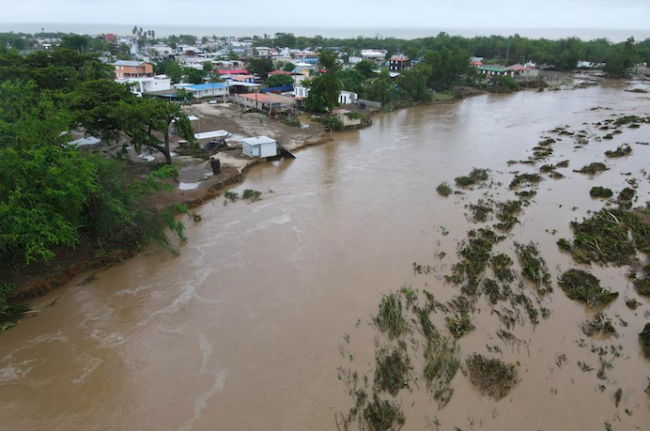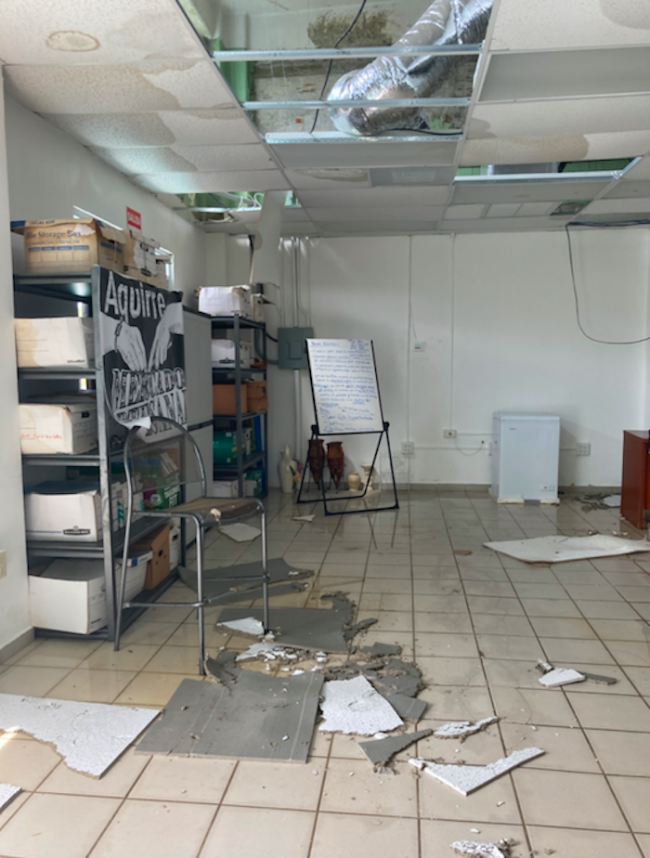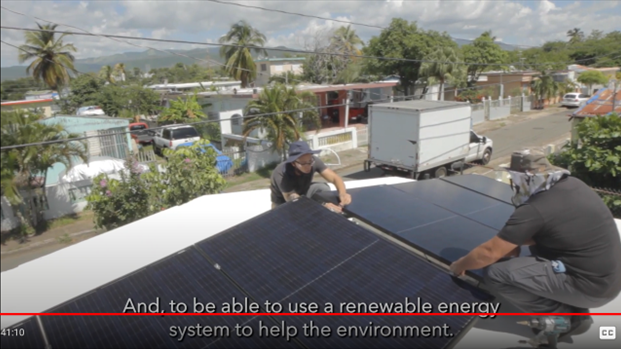
On September 20, 2022, many people in Puerto Rico experienced the five-year anniversary of Hurricane María without electricity and running water. Fiona, a category 1 hurricane, dealt yet another devastating blow to the archipelago’s centralized energy system, which relies on imported fossil fuels. When Fiona made landfall on September 18, only households and businesses with rooftop solar or generators were able to keep the power on. The dangerous storm damaged and destroyed roads, bridges, and water infrastructure, downed electric transmission and distribution lines, caused landslides, and flooded entire neighborhoods, leaving many without safe and healthy living conditions.
Puerto Rico’s existing electric transmission and distribution lines run primarily from the south, where the two most polluting fossil-fired power facilities are located, to the San Juan metropolitan area. The power plants in the south are sited in low-income, low-wealth neighborhoods, home to many Afrodescendant and Black Puerto Rican families already dealing with environmental racism. Most people in southeastern Puerto Rico and in many other marginalized areas have no way to access alternative sources of energy. With lack of access to drinking water and power, people will die as a result of this power outage. Especially given the timing of this latest hurricane, the ongoing impacts of climate colonialism have reopened still unhealed wounds from five years earlier.
Since Hurricane María in 2017, the Federal Emergency Management Agency (FEMA) has allocated an unprecedented $16 billion for Puerto Rico’s electric system and hazard mitigation. Yet local authorities have opted to rebuild the exact same system that repeatedly collapses. The ethical, relevant investment of FEMA funds is a matter of saving lives, equity, and environmental, climate, and energy justice.
Puerto Rico’s current fossil-fuel powered electric system puts the most marginalized communities in harm's way. This network of energy colonialism is an everyday source of contamination, whether in the form of coal ash, toxic waste, or other pollutants, and these conditions contribute to disproportionately high levels of cancers, respiratory ailments, cardiovascular diseases, and skin rashes, among other health problems. This lethal system also contributes greatly to greenhouse gas emissions that are responsible for global heating, and the constant power outages inflict significant economic and emotional stress on the low-income, low-wealth communities most negatively impacted by them.
Puerto Rico Epitomizes Energy Colonialism and Injustices
In 2020, Puerto Rico handed over operation and maintenance of its power distribution and transmission to LUMA Energy, a joint venture created specifically for the job by Texas-based Quanta Services and Alberta-based ATCO. Luma, however, is performing even worse than the Puerto Rico Electric Power Authority (PREPA), which previously oversaw the archipelago’s electric energy system. Since LUMA took over most components of the electric system in June 2021, residents have experienced an uptick in power outages and fluctuations in electric voltage and current.
The deterioration of the electrical system under LUMA has had adverse effects on public health, as hospitals, healthcare centers, and homes are frequently left without power. The instability puts life and property at risk by causing damage to appliances, medical equipment, and even generators. As a result, expensive appliances may stop working, refrigerated food and medicine often spoils, and electric home-health medical equipment becomes unreliable or unusable. The damages have affected small and large businesses, essential institutions such as schools, as well as food inventories, all of which cause distress, economic losses, and disruptions in services.
While the economic losses from constant power outages can be measured, the enormous emotional toll and suffering caused by the ongoing, entwined energy and climate crises is much harder to quantify. All the while, LUMA lobbies to rebuild the existing centralized, fossil-fuel-enabling transmission and distribution system with a historic amount of federal disaster recovery funds.

The archipelago’s dependence on expensive imports makes the cost of living high—and unaffordable for many residents. When high-priced appliances, medicine, or home health equipment are damaged, most people do not have the income or savings to purchase these items time and again. As far as we know, neither LUMA nor the local or federal governments have set up an accessible and satisfactory claims process for reimbursement for damaged appliances or other expenses incurred from the constant power outages. It is abundantly clear that the centralized electric energy system does not function amid the chaotic and cruel climate realities experienced in Puerto Rico and throughout the Caribbean.
In the aftermath of Hurricane María, Puerto Rico’s transmission and distribution system and centralized energy generation proved unreliable and dangerous. Promises of false “solutions” to the problem led to several scandals with U.S.-based companies and PREPA. For example, Montana-based Whitefish Energy and Oklahoma-based Cobra profited handsomely from dubious work and no-contract bids. In 2020, New York-based company New Fortress Energy built a liquefied gas terminal to import highly volatile methane gas to San Juan. The terminal is frequently inoperable and lacks the necessary authorization from the Federal Energy Regulatory Commission.
In southern Puerto Rico, the coal-fired power plant in Guayama, owned by Virginia-based AES, continues to spew toxins and contaminate the South Coast Aquifer. Thousands of people rely on this water source for potable water, and Hurricane Fiona’s destruction of critical water infrastructure has added major barriers to accessing clean drinking water.
Additionally, large-scale renewable energy installations also are vulnerable to extreme climate-disruption-driven storms because of their centralized nature. The Punta Lima Wind Farm was blown away by Hurricane María, as was a utility-scale, land-based solar array near where the storm made landfall. Similar infrastructural problems emerged during and following Hurricane Fiona. Meanwhile, existing decentralized solar alternatives demonstrate that other models are not only possible but vital.
Distributed Rooftop Solar for Energy Justice
Through a proposal called We Want Sun/Queremos Sol, civil society groups are calling on PREPA to deny the renewal of LUMA’s contract, which expires on November 30. Rather than extend the unreliable services of a private company, advocates are urging the local government to invest FEMA recovery funds in life-saving, distributed renewable energy, primarily rooftop solar and battery energy storage systems (batteries). Such investment would provide power to Puerto Rico residents, businesses, and other organizations, even in extreme situations of climate crisis.
We understand the potential of this kind of distributed renewable energy first-hand. One of us (Ruth) experienced these intensely difficult conditions in Puerto Rico during Fiona but was able to keep the power on throughout the storm and ongoing destruction because of rooftop photovoltaics on her home.
Termination of the LUMA contract would release a historic amount of disaster recovery funds that could be used to equip residences, businesses, hospitals, schools, and other buildings with batteries and distributed solar energy systems, mainly on rooftops but also on parking lots and on other suitable places. These funds should not be used to rebuild the same vulnerable, centralized power grid, powered by imported fossil fuels. Refusing this hazardous dependency and opting for a distributed alternative also would spare scarce land that should not be sacrificed to build industrial-scale renewable energy projects. Agricultural and ecological land must be reserved for other purposes, including for cultivating food sovereignty and reclamation efforts.
Puerto Rico need not be a place of disaster. The people of the archipelago already have mapped out—and in some places built—solutions to these challenges, as they refuse the centralized, fossil fuel system. Sixteen-billion dollars are already earmarked to save residents’ lives. How many more people need to die for FEMA to invest in rooftop solar alternatives?
The Biden-Harris administration must make good on its commitment to tackle the climate crisis and center environmental, climate, and energy justice by positioning Puerto Rico as an example of what recovery funds can do to transform the electric system. It is past time for the reimaginings provided by our communities to be taken seriously to create new systems that transform power and advance justice. The Queremos Sol proposal must be supported. For immediate mutual aid in the aftermath of Hurricane Fiona, archipelago and diasporic collaborators have organized a call for donations directly to Jobos Bay communities. Puerto Rico and all its Caribbean island neighbors need energy justice now!
Ruth Santiago is an environmental and community lawyer who lives and works in Salinas, Puerto Rico. She is a member of the White House Environmental Justice Advisory Council and is a trustee on the board of Earthjustice.
Catalina de Onís is a faculty member in the Clark Honors College at the University of Oregon. She is the author of Energy Islands: Metaphors of Power, Extractivism, and Justice in Puerto Rico (University of California Press, 2021) and co-author of bilingual children’s book La justicia ambiental es para ti y para mí/Environmental Justice Is for You and Me (Editora Educación Emergente, 2021). Find out more about her research, teaching, and advocacy work.
Hilda Lloréns is an associate professor of anthropology and marine affairs at the University of Rhode Island. She is the author of Making Livable Worlds: Afro-Puerto Rican Women Building Environmental Justice (University of Washington Press, 2021), Imaging the Great Puerto Rican Family: Framing Nation, Race, and Gender during the American Century (Rowman & Littlefield, 2014), and other publications.


